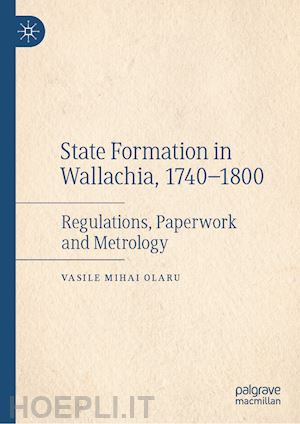
Questo prodotto usufruisce delle SPEDIZIONI GRATIS
selezionando l'opzione Corriere Veloce in fase di ordine.
Pagabile anche con Carta della cultura giovani e del merito, 18App Bonus Cultura e Carta del Docente
This book explores the transformation of the state in Wallachia, an Ottoman tributary principality, between 1740 and 1800, by focusing on three administrative techniques: regulations, paperwork (registers, identification certificates), and weights and measures. The implementation by the central power of regulations, bookkeeping, certificates, and standard units of measurement was not smooth, but it nevertheless heralded the beginning of the struggle against localism and the efforts to extend the boundaries of legitimate state action. The author challenges the (mostly Romanian) historiography of the Phanariot period, which has portrayed the state as a set of institutions undertaking certain responsibilities and has insisted almost exclusively on its extractive function and abusive character. Instead, this book takes a closer look at how the Wallachian state functioned, examining how its means of interacting with its subjects changed in the second half of the eighteenth century. Rethinking the problem of the state in eighteenth-century Wallachia, traditionally regarded as a mere instrument of Ottoman domination, it claims that it was precisely during this time that the bases of modern statehood were laid in a context defined by imperial rivalries (Ottoman, Habsburg, Russian) in the region. Making the case for state formation in the absence of preparation for war, the author also stresses, in contrast to recent contributions that decentre the state, the need to study the process whereby the effect of state coherence is produced. While focusing on Wallachia, this book provides valuable reading for those interested in early modern administrative and legal history, the history of state formation, and Southeast European history more generally.
Vasile Mihai Olaru is a researcher at the “George Baritiu” Institute of History of the Romanian Academy, Romania. His research interests include early modern history, state formation, the history of corruption, and historiography. Previously, he studied at Central European University in Budapest, where he received his PhD.











Il sito utilizza cookie ed altri strumenti di tracciamento che raccolgono informazioni dal dispositivo dell’utente. Oltre ai cookie tecnici ed analitici aggregati, strettamente necessari per il funzionamento di questo sito web, previo consenso dell’utente possono essere installati cookie di profilazione e marketing e cookie dei social media. Cliccando su “Accetto tutti i cookie” saranno attivate tutte le categorie di cookie. Per accettare solo deterninate categorie di cookie, cliccare invece su “Impostazioni cookie”. Chiudendo il banner o continuando a navigare saranno installati solo cookie tecnici. Per maggiori dettagli, consultare la Cookie Policy.